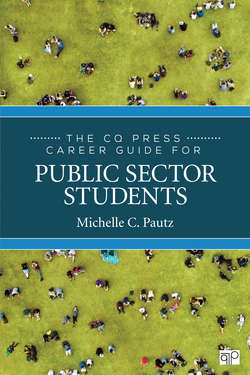Читать книгу The CQ Press Career Guide for Public Sector Students - Michelle C. Pautz - Страница 6
На сайте Литреса книга снята с продажи.
ОглавлениеPreface
Introduction
As we look at the world around us, no matter where we identify ourselves politically or what issues we prioritize, there are changes we would all like to see in society and government. And more often than not, those changes are actioned by the individuals who work in the public sector. Over the years, as I work with undergraduate and graduate students, I find constant inspiration in those students and their desires to make the world a better place. And in conversations with these individuals, I am regularly reminded how intimidating the public sector can appear from the outside, how confusing it seems, and how hard it is to navigate those initial professional steps in public service. Accordingly, this guide captures the themes of so many of those conversations that I have with students as they sought to serve the public in a range of capacities. I offer no assurances that this guide will help you instantly figure it all out (indeed, I still have much to figure out!), but what I hope this guide will do is help you demystify the public sector, think seriously about a career in it, and engage in some activities that will help you figure it out.
I am deeply appreciative of all the students who have allowed me to walk with them during parts of their journey to finding meaningful and fulfilling work in the public sector and to chip away at the problems they see around us. These students and all the public servants motivate me and inspire me daily.
Why I Study Public Administration and Do What I Do
Before I can offer you thoughts and activities to help you find your path, it’s only fair that I share a bit of my story about how I came to be fascinated by the public sector and have devoted my professional life to education for the public sector. Growing up, I always loved social studies. And I couldn’t watch or read enough news coverage as a middle and high school student. I am not sure what accounts for this fascination as my parents both vote regularly and pay attention, but they aren’t captivated by the government the way I am.
When I started my college career, I wanted to major in film studies because I loved movies and worked in movie theaters and video stores. But I didn’t want to make movies, I just wanted to study them and evaluate them. I was unsure how this would offer me a future after school. My other passion was government but I had no idea what I would do after college with government, but I knew I needed to get a job. I didn’t think I could get a job with a degree in political science—little did I know—so I majored in economics thinking that still involved the government but was in the business school, so I must be able to get a job. While I was in college, I realized I could add both political science and public administration as majors and still graduate on time, so I did. And I came to understand the range of job possibilities in these fields.
I took a course in environmental policy in my sophomore year that I loved. I’m not quite sure why it resonated with me—I remember how great and motivating the professor was, but I wasn’t particularly enamored with environmentalism prior to the course. The next semester I took an environmental economics course and was equally inspired. As luck would have it, one of my professors told me about a state government internship program. So, I checked it out. I had no idea what an internship was really all about, but I knew it was better that I do something like that rather than work in a movie theater for yet another summer. Ultimately, I interned for what was then called the North Carolina Department of Environment and Natural Resources, and I was hooked. I was fascinated by environmental regulations, the workings of government, and how stuff got done. I continued interning there for another summer.
My undergraduate theses looked at different aspects of environmental policy, and I wanted to learn more. Since I was little, I always wanted to teach, but I didn’t think that I wanted to teach elementary or high school. By the end of my college career, another professor of mine suggested I consider graduate school in public administration and that sounded like a great idea—if I’m being honest, I mostly wanted to delay any adult decision making for another couple of years, so a master’s degree seemed perfect. In the back of my mind, I thought that if I could make it in graduate school, maybe I would get a PhD and become a college professor. The rest, as they say, is history.
